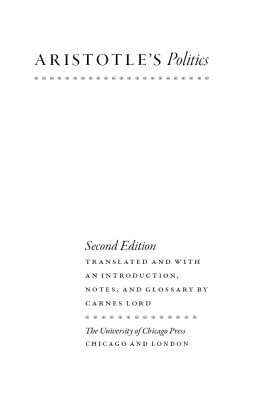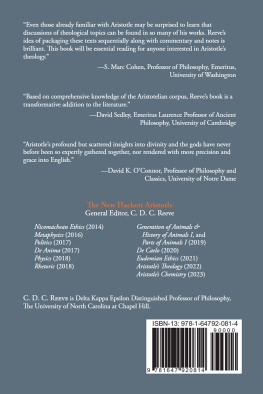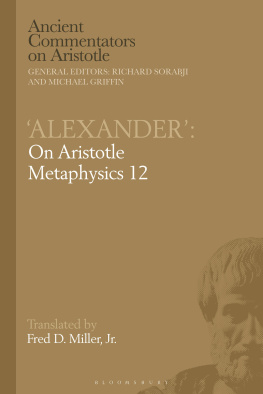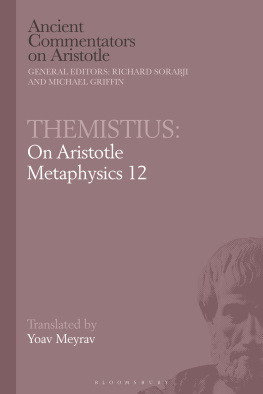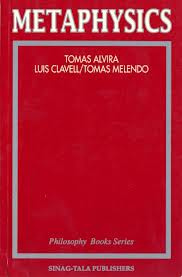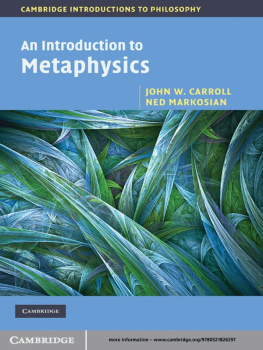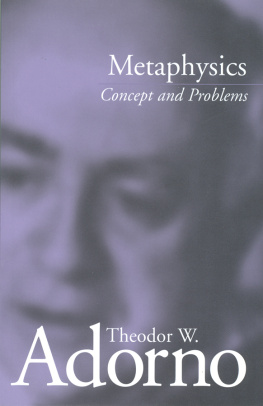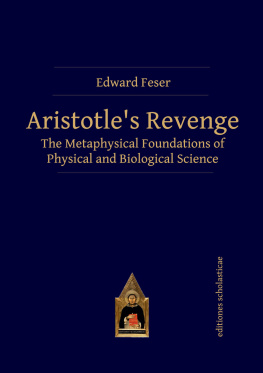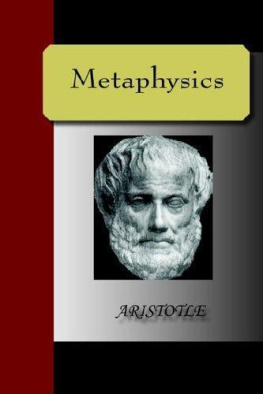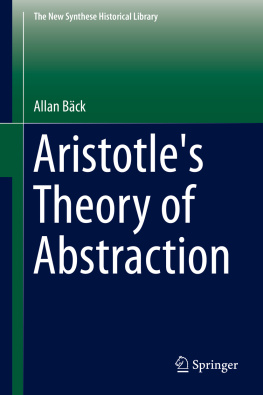
METAPHYSICS
ARISTOTLE was born at Stageira, in the dominion of the kings of Macedonia, in 384 BC. For twenty years he studied at Athens in the Academy of Plato, on whose death in 347 he left, and, some time later, became tutor of the young Alexander the Great. When Alexander succeeded to the throne of Macedonia in 335, Aristotle returned to Athens and established his school and research institute, the Lyceum, to which his great erudition attracted a large number of scholars. After Alexanders death in 323, anti-Macedonian feeling drove Aristotle out of Athens, and he fled to Chalcis in Euboea, where he died in 322. His writings, which were of extraordinary range, profoundly affected the whole course of ancient and medieval philosophy, and they are still eagerly studied and debated by philosophers today. Very many of them have survived and among the most famous are the Ethics and the Politics.
HUGH LAWSON-TANCRED was born in 1955 and educated at Eton and Balliol College, Oxford. He is currently a Departmental Fellow in the Department of Philosophy at Birkbeck College in the University of London. He has published extensively on Aristotle and Plato and is engaged in research in the philosophy of linguistics and cognitive science. He also translates widely from the Slavonic and Scandinavian languages. His translations of Aristotles The Art of Rhetoric and De Anima are also published in Penguin Classics. He is married with a daughter and a son and lives in north London and Somerset.
ARISTOTLE
Metaphysics
Translated with an introduction by
HUGH LAWSON-TANCRED
PENGUIN BOOKS
PENGUIN BOOKS
Published by the Penguin Group
Penguin Books Ltd, 27 Wrights Lane, London W8 5TZ, England
Penguin Putnam Inc., 375 Hudson Street, New York, New York 10014, USA
Penguin Books Australia Ltd, Ringwood, Victoria, Australia
Penguin Books Canada Ltd, 10 Alcorn Avenue, Toronto, Ontario, Canada M4V 3B2
Penguin Books (NZ) Ltd, 182 190 Wairau Road, Auckland 10, New Zealand
Penguin Books Ltd, Registered Offices: Harmondsworth, Middlesex, England
This translation first published 1998
1 3 5 7 9 10 8 6 4 2
Copyright Hugh Lawson-Tancred, 1998
All rights reserved
The moral right of the translator has been asserted
Except in the United States of America, this book is sold subject
to the condition that it shall not, by way of trade or otherwise, be lent,
re-sold, hired out, or otherwise circulated without the publishers
prior consent in any form of binding or cover other than that in
which it is published and without a similar condition including this
condition being imposed on the subsequent purchaser
PARENTIBUS OPTIMIS
CONTENTS
THE METAPHYSICS
PREFACE
There are, no doubt, some books of which it can be justly claimed that they will both prove invaluable for the new student and be a source of stimulation for experienced readers. This is not such a book. Indeed, I have doubts about the extent to which such a work can be produced on the subject, at any rate, of Aristotelian metaphysics.
Forced, therefore, into choosing between an exoteric or an esoteric translation of the Metaphysics, I have complied with the constraints of time and of the limitations of my own competence in seeking to address myself orbi rather than urbi. The result, I hope, will be a useful, if humble, rung on the Wittgensteinian ladder up which anyone seeking to become acquainted with Aristotles central ruminations on the substance of the world must climb.
Three brief acknowledgements. I would like to express my gratitude to the Philosophy Department of Birkbeck College, to whom I am indebted for an extraordinary amount of philosophical stimulation and encouragement over the last ten years. During the course of making this translation, I became a husband and a father. This experience has caused me to wonder whether Aristotle may exaggerate the importance of what persists through any change. An older debt of similar nature is acknowledged by the Dedication.
H. C. L.T.
Queens Park
June 1998
INTRODUCTION
1. Substance
What is the purpose of studying metaphysics, and what is the purpose of studying the Metaphysics? It has been argued in the twentieth century (and before) with great force, elegance and coherence that there is no point in studying either, and indeed that the temptation to take seriously the latter and perhaps also the former can only be a source of deep philosophical perplexity. On the other hand, in previous philosophical epochs metaphysics was routinely regarded as the pinnacle of philosophical speculation and the Metaphysics was effectively taken to be its founding charter. There have been many great thinkers for whom the most important question in philosophy has been what response we should make to the claims of metaphysicians in general and of Aristotle in particular.
Of course, we cannot tell the value of metaphysics until we have agreed what it is, nor that of the Metaphysics until its central doctrines are at least provisionally familiar. In this introduction I shall say a little about the ambitions and limitations of metaphysical thinking and then try to show why Aristotles treatise should be considered a paradigm of such thinking, whatever attitude we come to take to its central claims. I also broach two other topics. The first concerns the peculiar nature of the Metaphysics as a composition (some would say a compilation). The general architecture of the work is fraught with problems, and there are intriguing and important issues about just how the text that we have before us came into being. The second topic I discuss is the nature and purpose of the present translation.
Many philosophers, conspicuously including Aristotle, as we shall see, have held the view that the understanding of anything either depends on or is profoundly facilitated by obtaining the correct definition of it at the start of ones investigation. If this is right, then it seems certain that we cannot reach understanding of philosophy itself, and certainly not of metaphysics. Many attempts have been made to put into a nutshell the core project of the metaphysician, but severally and collectively they serve only to show that the subject is too elusive and strange to be pinned down in any very manageable way. The nature of metaphysics can only be indicated, if at all, by suggestion rather than stipulation. And perhaps the best way to suggest its nature is to contrast it with other forms of inquiry, and especially with science. The nature of science itself is hardly perspicuous, but it will perhaps be agreed that science attempts to clarify the structure and processes of our world through the patient observation of its sensible phenomena and the cautious or bold construction of hypotheses that are in some way answerable to such observations. The conclusions of science are provisional, their confirmation holistically sensitive to the repercussions of events across the whole range of our experience. This sensitivity of the conclusions of science seems ambiguous and has always been taken in two ways, either as an indication that the scientist is responding to a pattern outside himself to which he must constantly adjust his assumptions or as a reason for deep scepticism about the capacity of the whole enterprise to deliver a convincing picture of the world.
If the latter attitude is adapted to the evolving image that science offers, then this can either be the occasion of a more comprehensive scepticism which holds that there are, quite generally, severe restrictions on the understanding that we can have in any way of our predicament or lead to the desire to seek some more secure, and therefore fundamental, formof knowledge about the world which will not be thus vulnerable to the fluctuations of theoretical fashion. This desire is the point of departure for metaphysics. What the metaphysician is after is a comprehensive account of how the world is that is somehow immune to the uncertainties overshadowing all our reflections on the course and content of our experience. The metaphysician wants to understand the world once and for all.



